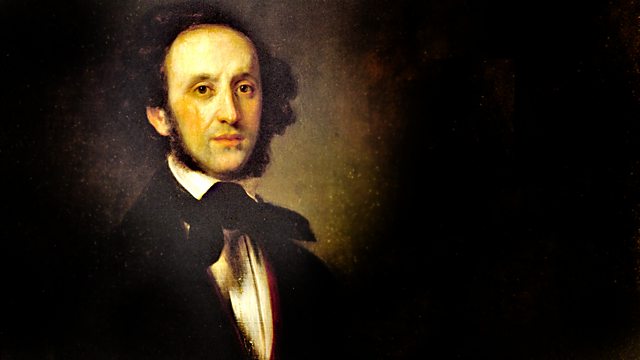
Episode 5
Donald Macleod concludes his survey of Mendelssohn as the composer's elation at the success of his oratorio Elijah turns to despair at the death of his beloved sister Fanny.
Donald Macleod concludes his exploration of Mendelssohn's last seven years with a look at the genesis of his oratorio Elijah, whose popularity in Victorian England was second only to that of Handel's Messiah - certainly not a claim that could be made today, when it tends to be regarded as the height of kitsch. In 1846, the city of Birmingham invited Mendelssohn to take charge of its music festival. He turned the job down, but agreed instead to compose an oratorio for the festival. After the earlier success of his oratorio St Paul, Mendelssohn had considered composing an Elijah; the Birmingham commission prompted him to return to this idea, which he'd had on the back burner for the past 10 years. The first performance was a huge success - "Never was there a more complete triumph!", as The Times put it - but Mendelssohn wasn't completely satisfied, and immediately set about overhauling the work for the London première the following year. According to a contemporary report it was met with a "long-continued unanimous volley of plaudits, vociferous and deafening applause." Mendelssohn's elation, however, was short-lived. On his return to Germany he was met by a letter from his brother Paul, telling him that their beloved sister Fanny had suffered a series of strokes and died - while rehearsing one of his pieces. Mendelssohn remained in a state of emotional collapse for some time, but when he was able to compose again he poured his grief out in his anguished 6th String Quartet - the last major work he completed before his own death, just two months later.
Last on
More episodes
Next
You are at the last episode
Music Played
-
![]()
Rachel Bennett, Clare Wilkinson, Andrew Tortise & Christopher Adams
Magnificat, op.69 no.3, for choir and solo
-
![]()
John Mark Ainsley, Bryn Terfel, Renée Fleming, Libby Crabtree, Patricia Bardon, Edinburgh Festival Chorus, Orchestra of the Age of Enlightenment & Paul Daniel
Elijah, op.70 - extract from Pt 2:
- Decca.
- 455688.
- 4–9.
-
![]()
Gewandhaus-Quartet
String Quartet in f minor, op.80
- NCA.
- 60205.
- 3.
-
![]()
Rachel Bennett, Clare Wilkinson, Andrew Tortise & Christopher Adams
Magnificat, op.69 no.3, for choir and solo
-
![]()
Felix Mendelssohn
Elijah, op.70 - extract from Pt 2
-
![]()
Felix Mendelssohn
String Quartet in f minor, op.80
Broadcasts
- Fri 22 Apr 2011 12:00����ý Radio 3
- Fri 22 Apr 2011 22:00����ý Radio 3
- Fri 9 Nov 2012 12:00����ý Radio 3
- Fri 9 Nov 2012 18:30����ý Radio 3
Beethoven Unleashed – the box set
What was really wrong with Beethoven?
Composers A to Z
Who knew? Five eye-opening stories from Composer of the Week
Five reasons why we love Parry's Jerusalem
What is the strange power of Jerusalem which makes strong men weep?
A man out of time – why Parry's music and ideas were at odds with his image...
The composer of Jerusalem was very far from the conservative figure his image suggests.
Composer Help Page
Find resources and contacts for composers from within the classical music industry.





